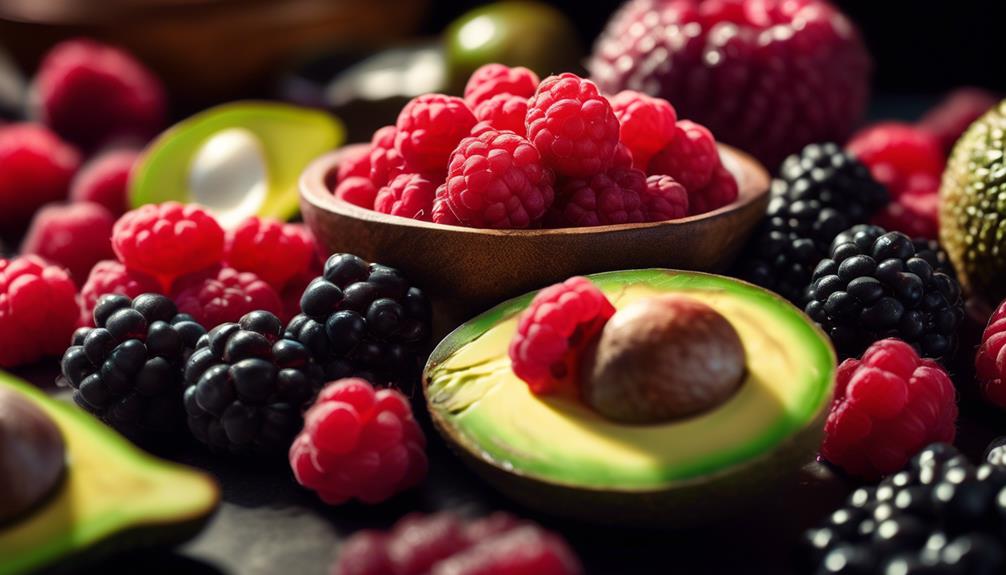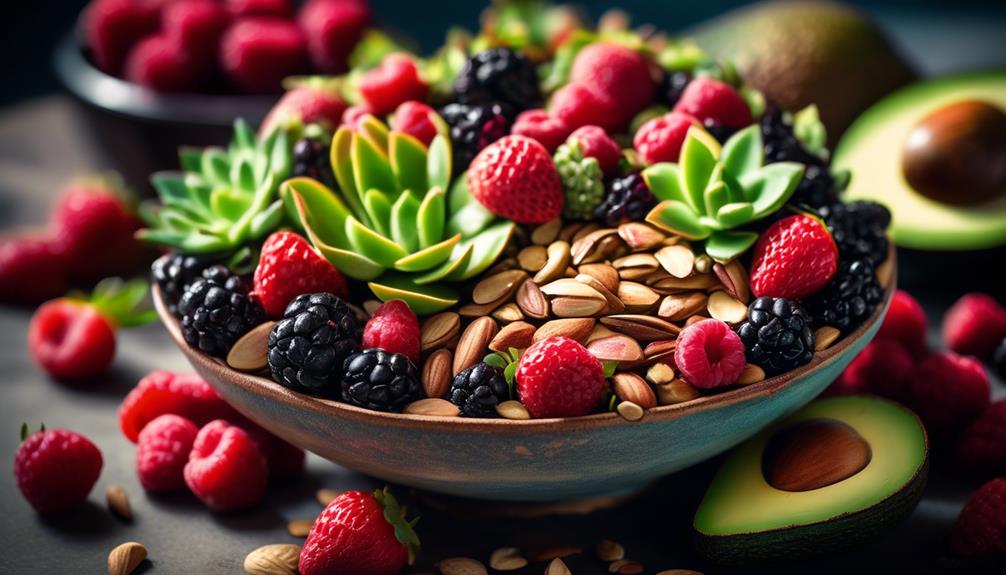By sheer coincidence, you stumble upon a selection of low-sugar fruits that seem tailor-made for your keto diet. But why exactly are these fruits perfect for your low-carb lifestyle?
Well, let's just say they offer more than just a sweet taste. These low-sugar fruits not only support your fat-burning goals but also help maintain stable blood sugar levels. And that's just the beginning.
So, if you're curious to uncover the other hidden benefits and discover delicious ways to incorporate these fruits into your keto journey, then this discussion is just what you need.
The Benefits of Low-Sugar Fruits

Low-sugar fruits offer numerous benefits that can support your keto diet and help you achieve your health and fitness goals. When it comes to weight loss, incorporating fruits into your diet can be a smart choice. Fruits are generally low in calories and high in fiber, both of which can promote feelings of fullness and aid in weight management. Certain low-sugar fruits, such as berries, are particularly beneficial for weight loss due to their high fiber content. Fiber helps slow down digestion, keeping you satisfied for longer and reducing the likelihood of overeating.
In addition to their weight loss benefits, low-sugar fruits can also be a great option for managing diabetes. High blood sugar levels are a common concern for individuals with diabetes, and choosing fruits that are lower in sugar can help regulate blood sugar levels. Low-sugar fruits, like avocados and lemons, have minimal impact on blood sugar levels while still providing essential nutrients. Incorporating these fruits into your diet can help you maintain stable blood sugar levels, which is crucial for diabetes management.
Fruits With the Lowest Carb Content
When following a keto diet, it's important to choose fruits that have the lowest carb content. This is because a ketogenic diet restricts carbohydrate intake to induce a state of ketosis, where the body burns fat for fuel instead of carbohydrates. While most fruits are high in natural sugars, there are a few low-carb options that can be incorporated into a keto meal plan.
Berries are excellent choices for low-carb fruit recipes. Strawberries, raspberries, and blackberries are all packed with antioxidants and fiber while remaining relatively low in carbs. For example, one cup of strawberries contains only about 11 grams of net carbs.
Avocados are another great option for a low-carb fruit on a keto diet. They're high in healthy fats and fiber, making them a filling and satisfying choice. One medium-sized avocado contains only 2 grams of net carbs.
The role of fiber in a ketogenic diet is crucial. Fiber helps to slow down digestion, preventing blood sugar spikes and promoting feelings of fullness. It also aids in healthy digestion and can help regulate bowel movements.
Nutrient-Packed Options for Ketogenic Dieters

Now let's explore the nutrient-packed options for ketogenic dieters.
Low-sugar fruits not only offer a sweet and refreshing taste, but they also provide important vitamins, minerals, and antioxidants.
These fruits can be a valuable addition to a keto diet, offering both flavor and nutritional benefits.
Benefits of Low-Sugar Fruits
Discover the nutrient-packed options of low-sugar fruits that can benefit ketogenic dieters.
When following a keto diet, it's important to choose fruits that are low in sugar and carbohydrates. Fortunately, there are several delicious options that fit the bill.
Berries, such as strawberries, blackberries, and raspberries, are excellent choices as they're low in both sugar and carbs. These fruits are also rich in antioxidants, vitamins, and fiber, which can support overall health.
Another great option is avocados, which are technically a fruit. Avocados are low in sugar and packed with healthy fats, making them a perfect addition to a keto diet.
Lastly, lemons and limes are low in sugar and can add a burst of flavor to your meals and beverages.
Incorporating these low-sugar fruits into your ketogenic diet can provide you with essential nutrients while keeping your carb intake in check.
Nutritional Value of Keto-Friendly Fruits
To understand the nutritional value of keto-friendly fruits, it's important to consider their nutrient-packed options for ketogenic dieters. These fruits offer a range of nutritional benefits that can support weight management and overall health. Here are five examples:
- Avocado: Rich in healthy fats and fiber, avocados provide essential nutrients like potassium and vitamin K.
- Berries: Low in carbs and high in antioxidants, berries such as strawberries and blackberries are packed with vitamins and minerals.
- Coconut: This versatile fruit offers medium-chain triglycerides (MCTs) that can be easily converted into energy by the body.
- Lemon: With its refreshing taste, lemons are a good source of vitamin C and can aid digestion.
- Tomatoes: While technically a fruit, tomatoes are low in carbs and contain lycopene, a powerful antioxidant.
Incorporating these nutrient-dense fruits into a ketogenic diet can provide both flavor and valuable nutritional benefits for weight management.
Best Low-Carb Fruit Options
Including low-carb fruits in your ketogenic diet can provide a range of nutrient-packed options to support your health and weight management goals. When it comes to low-sugar fruit options that are keto-friendly, there are a few standout choices.
Berries, such as strawberries, raspberries, and blackberries, are excellent options due to their high fiber content and low sugar levels. Avocados, while technically a fruit, are also a great choice for keto dieters. They're low in carbs, high in healthy fats, and packed with nutrients like potassium and vitamin C.
Additionally, lemons and limes are low in carbs and can add a burst of flavor to your meals and beverages. Incorporating these low-carb fruits into your ketogenic diet can provide both taste and nutritional benefits while keeping your carb intake in check.
How Low-Sugar Fruits Support Fat Burning

Low-sugar fruits play a crucial role in supporting fat burning while following a ketogenic diet. By understanding their glycemic impact on ketosis, you can make informed choices that keep your insulin response under control.
These fruits also serve as natural sugar alternatives, helping you satisfy your sweet cravings without derailing your fat-burning goals.
Glycemic Impact on Ketosis
Consuming low-sugar fruits can play a crucial role in supporting fat burning while following a ketogenic diet due to their minimal impact on glycemic levels. When it comes to maintaining ketosis, the glycemic impact of foods is essential for regulating insulin levels and promoting fat burning.
Here are five reasons why low-sugar fruits are perfect for keto:
- Low glycemic index: Low-sugar fruits have a low glycemic index, which means they've a minimal effect on blood sugar levels, preventing spikes in insulin production.
- Fiber content: These fruits are rich in dietary fiber, which slows down digestion and helps stabilize blood sugar levels, promoting a steady release of energy.
- Nutrient density: Low-sugar fruits are packed with essential vitamins, minerals, and antioxidants, providing nourishment while keeping carb intake low.
- Natural sweetness: These fruits offer a touch of natural sweetness without the need for artificial sugar substitutes, making them a healthier choice for keto dieters.
- Versatility: From berries to avocados, low-sugar fruits offer a wide variety of options to add flavor and nutrition to your ketogenic meals.
Insulin Response Control
To support fat burning while following a ketogenic diet, it's important to understand how low-sugar fruits aid in controlling insulin response.
Insulin resistance management and blood sugar regulation play key roles in maintaining a state of ketosis. Low-sugar fruits, such as berries and avocados, have a minimal impact on blood sugar levels due to their low carbohydrate content. This means they produce a lower insulin response compared to high-sugar fruits like bananas or grapes.
By consuming low-sugar fruits, you can help keep your insulin levels in check, preventing insulin spikes that can inhibit fat burning.
Additionally, these fruits are rich in fiber and antioxidants, which further support insulin sensitivity and overall metabolic health.
Incorporating these low-sugar fruits into your ketogenic diet can help you achieve and maintain a state of fat burning.
Natural Sugar Alternatives
By incorporating natural sugar alternatives found in low-sugar fruits, you can effectively support fat burning while following a ketogenic diet. These natural sugar substitutes not only provide a sweet taste but also have a low glycemic index, which means they've a minimal impact on your blood sugar levels.
Here are five examples of low-sugar fruits that can help you achieve your fat burning goals:
- Strawberries: These juicy berries are packed with antioxidants and have only 7 grams of net carbs per cup.
- Avocados: Despite being a fruit, avocados are low in sugar and high in healthy fats, making them a perfect choice for keto.
- Blackberries: These delicious berries aren't only low in sugar but also high in fiber, promoting feelings of fullness and aiding digestion.
- Lemons: Although lemons are tangy and sour, they're incredibly low in sugar and can add a refreshing twist to your water or dishes.
- Raspberries: These vibrant berries are low in carbs and high in antioxidants, making them a great addition to your keto diet.
Incorporating these low-sugar fruits into your meals and snacks can help you satisfy your sweet tooth while supporting your fat burning goals on a ketogenic diet.
Maintaining Stable Blood Sugar Levels on Keto

To maintain stable blood sugar levels on the keto diet, it's crucial to focus on incorporating low-sugar fruits into your daily meal plan. Stabilizing insulin levels and managing cravings are key factors in achieving this stability.
When following a ketogenic diet, your body relies on fat for fuel instead of carbohydrates. This leads to a decrease in blood sugar levels and a reduction in insulin production. However, it's still important to maintain stable blood sugar levels to avoid spikes and crashes that can affect your energy levels and overall well-being.
Low-sugar fruits are an excellent choice for maintaining stable blood sugar levels on keto. These fruits contain fewer carbohydrates and natural sugars compared to other fruits. They provide essential vitamins, minerals, and fiber without causing significant spikes in blood sugar.
Antioxidant-Rich Fruits for Optimal Health
Incorporating antioxidant-rich fruits into your diet is essential for achieving optimal health. These fruits are packed with compounds that help protect your cells from damage caused by free radicals. Here are five antioxidant-rich fruits that can provide you with a wide range of health benefits:
- Blueberries: These small berries are known for their high antioxidant content, particularly anthocyanins. Studies have shown that consuming blueberries regularly can help improve brain function and may even reduce the risk of chronic diseases.
- Strawberries: Not only are strawberries delicious, but they're also a great source of antioxidants like vitamin C and anthocyanins. These compounds have been linked to improved heart health and reduced inflammation.
- Raspberries: Raspberries are another low-sugar fruit that's rich in antioxidants. They're particularly high in ellagic acid, which has been shown to have anti-cancer properties.
- Blackberries: Blackberries are rich in antioxidants called polyphenols, which have been associated with reduced oxidative stress and improved cognitive function.
- Cherries: Cherries are packed with antioxidants, including anthocyanins and vitamin C. These antioxidants have been shown to have anti-inflammatory and pain-relieving effects.
Incorporating these antioxidant-rich fruits into your diet can provide you with numerous health benefits. Whether you enjoy them in smoothies, salads, or low sugar fruit recipes, these fruits can help support your overall health and well-being.
Low-Sugar Fruits as a Source of Fiber

Low-sugar fruits offer a valuable source of fiber, supporting your digestive health and helping you maintain a balanced diet. Fiber is an essential nutrient that plays a crucial role in promoting regular bowel movements and preventing constipation. It adds bulk to your stool, making it easier to pass through your digestive system.
Increasing your fiber intake through low-sugar fruits can also help regulate blood sugar levels and reduce the risk of developing type 2 diabetes. Fiber slows down the absorption of sugar in the bloodstream, preventing spikes in blood glucose levels. This is especially important for individuals following a ketogenic diet, as they aim to minimize their carbohydrate intake and maintain stable blood sugar levels.
Furthermore, a high-fiber diet has been linked to a reduced risk of heart disease, stroke, and certain types of cancer. Fiber-rich foods, including low-sugar fruits, can help lower cholesterol levels, control blood pressure, and promote overall cardiovascular health.
To optimize your fiber intake from low-sugar fruits, it's important to choose varieties that are particularly high in fiber. Examples include raspberries, blackberries, strawberries, and avocados. These fruits not only provide fiber but also contain beneficial vitamins, minerals, and antioxidants.
Incorporating low-sugar fruits into your ketogenic diet can be an excellent way to increase your fiber intake and support your digestive health. Remember to consume them in moderation and consult with a healthcare professional or registered dietitian for personalized recommendations.
Delicious Ways to Incorporate Low-Sugar Fruits on Keto
Boost the flavor and nutritional value of your ketogenic diet by exploring creative ways to enjoy the goodness of low-sugar fruits. Incorporating these fruits into your meals can't only add a burst of delicious flavor, but also provide you with important health benefits. Here are some ideas to inspire you:
- Strawberry Spinach Salad: Combine fresh strawberries with spinach, goat cheese, and a balsamic vinaigrette for a refreshing and nutritious salad.
- Blueberry Chia Pudding: Mix chia seeds with unsweetened almond milk, vanilla extract, and a handful of blueberries. Let it sit overnight for a creamy and satisfying breakfast.
- Avocado and Grapefruit Salsa: Dice avocado and grapefruit, then mix with red onion, cilantro, and lime juice. This zesty salsa pairs well with grilled chicken or fish.
- Mixed Berry Smoothie: Blend together a mix of low-sugar berries like raspberries, blackberries, and strawberries with unsweetened coconut milk and a scoop of protein powder for a quick and filling snack.
- Watermelon and Feta Salad: Combine cubes of watermelon with crumbled feta cheese, mint leaves, and a drizzle of olive oil. This refreshing salad is perfect for hot summer days.
Conclusion
In conclusion, incorporating low-sugar fruits into a ketogenic diet offers numerous benefits.
Not only do these fruits provide essential nutrients and support fat burning, but they also help maintain stable blood sugar levels and promote optimal health with their antioxidant-rich properties.
For example, a case study found that a keto dieter who regularly consumed berries experienced improved energy levels and decreased inflammation.
Including low-sugar fruits in your keto journey can be both delicious and beneficial for your overall well-being.







